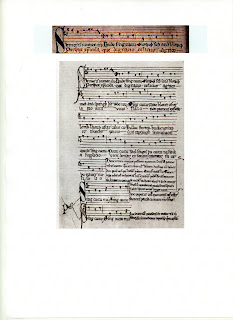I could shut my eyes and still know that summer is well on its way. On this sunny April Sunday my ears are under assault from an army of lawnmowers;
Mowers to left of me,
Mowers to right of me,
Mowers in front of me,
Roared and thundered
Mine not to make reply,
Mine not to reason why,
Mine but to sit and sigh,
While green grass is sundered.
(Apologies to Alfred, Lord Tennyson)
. . . but oh! the peace, the calm, the lovely silence when the mowers cease and the ear drums stop ringing and the birds can once more make themselves heard.
'Sumer Is Icumen In' is a traditional English folk canon and a six-part polyphonic song which was composed around 1260, at a time when 'modern' music was commonly in two or three-part polyphony.
Svmer is icumen in
Lhude sing cuccu!
Groweþ sed and bloweþ med
and springþ þe wde nu.
Sing cuccu!!
Awe bleteþ after lomb,
lhouþ after calue cu,
Bulluc sterteþ, bucke uerteþ.
Murie sing cuccu!
Cuccu, cuccu,
Wel singes þu cuccu.
ne swik þu nauer nu!
Sing cuccu nu, Sing cuccu!
Pes
Sing cuccu, Sing cuccu nu!
Summer is a-coming in
Loudly sing cuckoo
Groweth seed and bloweth mead
and springs the wood anew
Sing cuckoo!
Ewe bleateth aft-er lamb,
Calf loweth after cow,
Bullock starteth, buck farteth,
Merry sing cuckoo!
Cuckoo, cuckoo!
Well singest thou cuckoo,
Nor cease thou never now!
Sing cuckoo now, Sing cuckoo!
Foot (or Bass)
Sing cuckoo, Sing cuckoo now!
The manuscript containing performance instructions was found in Reading Abbey though it may not have been written there. It is now housed at the British Library. The language is Middle English (Wessex dialect).
No comments:
Post a Comment
Thank you for visiting. I love to read your comments and really appreciate you taking the time to respond to posts.
I will always try to repay your visit whenever possible.